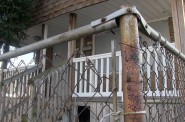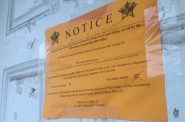Layton Boulevard West
South side neighborhood battles problem of 48 foreclosed homes.
Turnkey program makes 180-degree turnaround for foreclosed homes
As Jeremy Belot rests on the front porch of 831 N. 31st St., he listens to ‘90’s music coming from the paint-stained boom box radio. He sits tall, filled with pride and accomplishment. The sawdust virtually woven into the fabric of his clothing and busy construction workers around him remind Belot of how far a once-struggling historic Milwaukee neighborhood has come.
Belot is the creator and project manager of Layton Boulevard West Neighborhood’s Turnkey Renovation Program, which acquires, renovates and sells homes exclusively in the Layton Boulevard West neighborhood.
In 2008, when the Milwaukee housing crisis was at its peak, Belot and Layton Boulevard West Neighbors (LBWN) came up with the renovation program to help freeze the number of blighted and crumbling buildings in the neighborhood.
Some homes need a facelift while others desperately require more.
When Belot gets up from the porch he smiles and waves at the neighbor known to the workers as Colonel. Colonel offers a quiche to Charlotte John-Gomez, LBWN’s executive director, and a few workers.
“Take it; there’s one left,” Colonel says to John-Gomez as he reaches over the guardrail putting the plate within arm’s reach.
This sense of community is evident in the immigrant neighborhood full of working people. The block on 31st Street is typically quiet, except for the sound of drills, saws, hammers and the occasional “heads up” warning from one worker to another.
The home where Belot sits is getting a major update and waiting for a family to move in. Belot said people on the 800 block are not only excited about their new neighbors, but also grateful for the program, which provides a sense a community.
“If we can acquire it and then renovate it and make it have a curb appeal on the exterior and make it beautiful… it’s going to attract a good buyer and then [residents] can have a good neighbor and that uneasiness can go away,” he said.
Kazuoa Yang, who lives on the top floor of the Colonel’s duplex, has forged a bond with the turnkey team. Though construction can get loud at times, Yang is thankful the house next door will no longer be a potential magnet for crime and mischief.
“We’re so happy that it’s not going to be empty anymore,” Yang said.
Belot’s focus is on the four to five houses that the program is refurbishing, updating or completely gutting at any given time.
“We have some homes that have just been neglected and often those are the ones that do fall into foreclosure,” said Belot, who sees the opportunity for a 180-degree turnaround in those situations.
“We can turn them into a home that hopefully has another 100 years of life because of the improvements that we made to it.”
This story was originally published by Milwaukee Neighborhood News Service, where you can find other stories reporting on fifteen city neighborhoods in Milwaukee.
Article Continues - Pages: 1 2
Political Contributions Tracker
Displaying political contributions between people mentioned in this story. Learn more.
- March 28, 2016 - Michael Murphy received $25 from Aaron Szopinski
Foreclosures Block By Block
-
Clarke Square
 Jan 9th, 2015 by Ben Greene, Courtney Perry and Patrick Leary
Jan 9th, 2015 by Ben Greene, Courtney Perry and Patrick Leary
-
Five Neighborhoods With Foreclosure Problems
 Jan 7th, 2015 by Matthew Wisla
Jan 7th, 2015 by Matthew Wisla





















